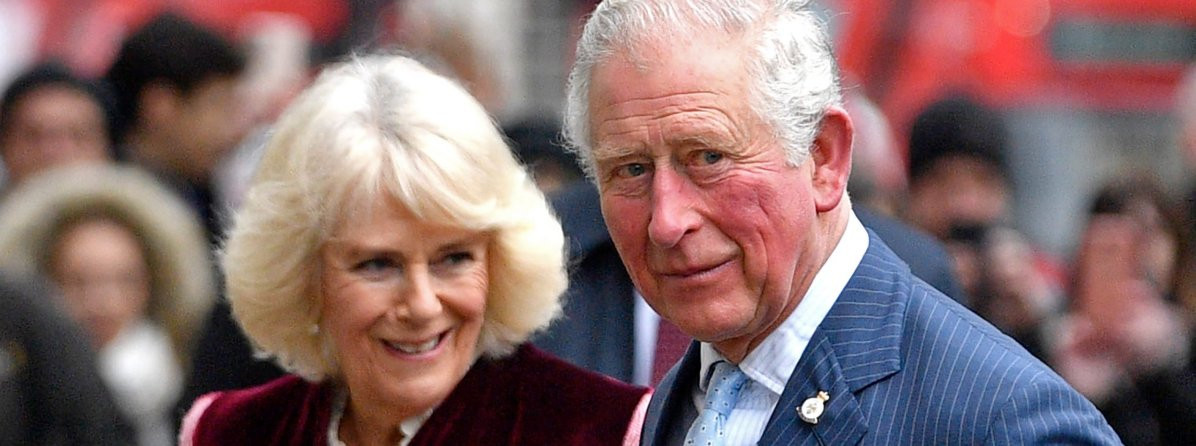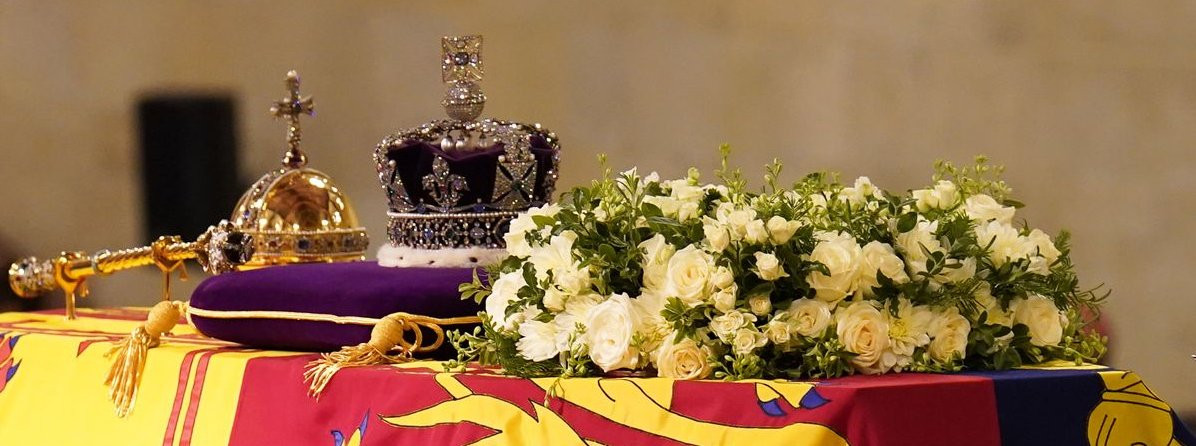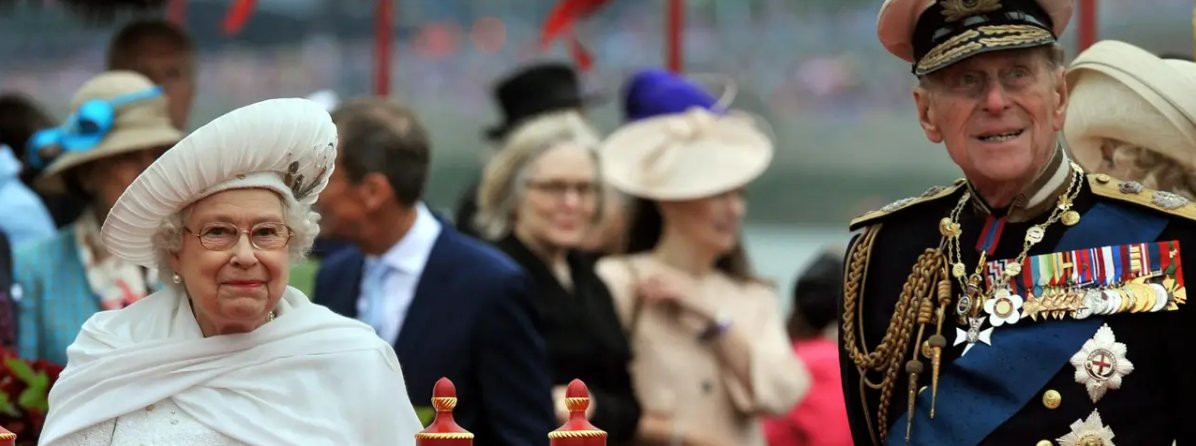
The Coronation of King Charles III and Queen Camilla
It was generally accepted that any attempt to imitate the full grandeur of 1953 would look ridiculous.
The Coronation of King Charles III and Queen Camilla by John Winterson Richards
The Coronation of King Charles III and Queen Camilla was the third great Royal television set piece in under a year. Queen Elizabeth II's Platinum Jubilee the previous Summer had been followed a few months later by her State Funeral. Both had attracted huge numbers of viewers, nationally and globally. Yet, to put it in the brutal language of the television business, their very success increased the pressure on what might be termed the third show in the series to be bigger and better.
At the same time there was a real danger of "pageantry fatigue" and considerable pressure to tone down the splendour at a time when many people were experiencing severe economic hardship. Not very subtle hints were dropped that, in constitutional terms, a Coronation was not strictly necessary, the King having become King the moment his mother passed.
Of course, there was never any chance that the United Kingdom would waste the opportunity for another display of "soft power" and free advertising on almost every news outlet on the planet. It is also safe to assume that the King and the Queen and the Prime Minister all had their personal reasons for something spectacular to go ahead.
The new King was nevertheless well advised to give a polite nod in the direction of those urging restraint by making it known that he did not want an extravagant Coronation. However, different people have different ideas what this means. Charles driving Camilla to the Abbey in a Fiat Panda for a quick blessing would be rather missing the point. The Royal Family have always shared Louis B Mayer's understanding that it is precisely when times are tough that people most appreciate a touch of glamour. To put on an obviously cheap, low budget show would have been entirely counterproductive.
Once again, television was central to the project. The whole thing was set up with camera angles in mind. The procession and the crowds were not as large as they were for Queen Elizabeth's Coronation in 1953, but they were going to be made to look as if they were.
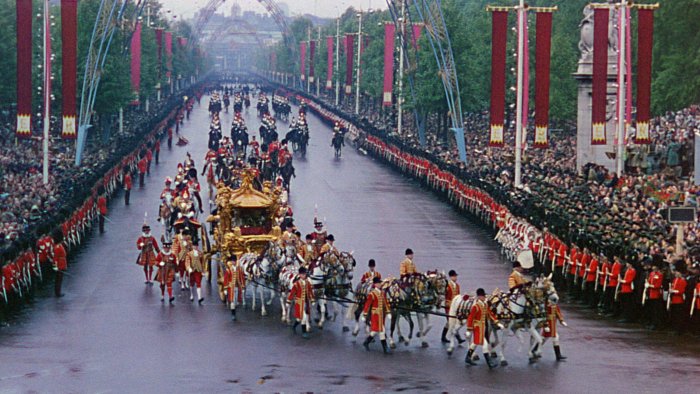
The 1953 Coronation
It was generally accepted that any attempt to imitate the full grandeur of 1953 would look ridiculous. At that point the United Kingdom was still, at least nominally, the "Home Country" of the greatest Empire the world had ever seen. There was simply no pretending that this was remotely the case only a few years later. Where National Service meant that Britain in 1953 maintained a large army, a powerful battle fleet, and a Royal Air Force basking in the glory of having saved the world only a few years before, by 2023 mounting a huge parade demanded a considerable proportion of the nation's small, professional Armed Services.
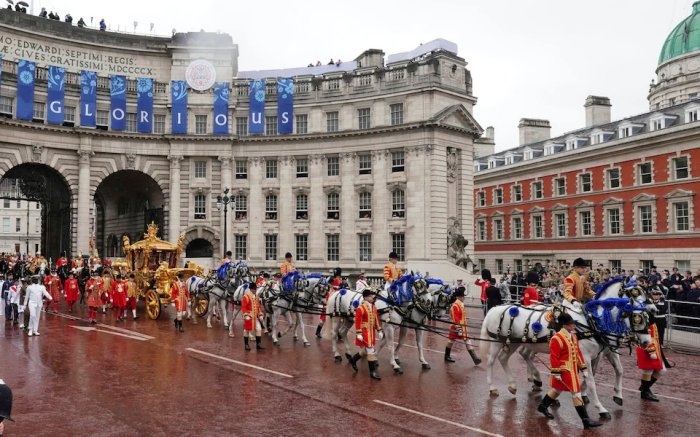
The 2023 Coronation
There had also been cultural changes within the United Kingdom. One of the most memorable scenes in 1953 was the ranks of crimson and ermine clad peers assuming their coronets after the Queen had been crowned. Then it was impressive. Now it would be derided. The expulsion of most Hereditary Peers from the House of Lords, followed by the creation of a huge number of Life Peerages, some of them controversial to put it politely, has transformed the status of the Peerage completely. Most Peers were therefore not invited and those who happened to get invitations were told to come in suits. As a last minute concession, following much discreet grumbling, they were allowed wear their Coronation Robes after all but not their coronets, which cannot be worn on any other occasion and are now therefore only so much scrap silver.
The number of Peers attending was in any case limited by health and safety regulations. It now seems astonishing that there were over 8,000 people in the Abbey in 1953, compared with only just over 2,000 in 2023. The greater emphasis on health and safety was also one of the factors reducing the size of the official processions and the crowds in the Mall. Despite that, one cannot help feeling that everything seemed a lot more spacious in the film of the 1953 Coronation and subsequent procession. It may have helped that people were physically a lot smaller back then, but it also made a difference that in 1953 the BBC deliberately employed cameramen of slight build to get lower angles that were conspicuous by their absence in 2023: outside broadcast directors seem to have a thing for high angles these days.
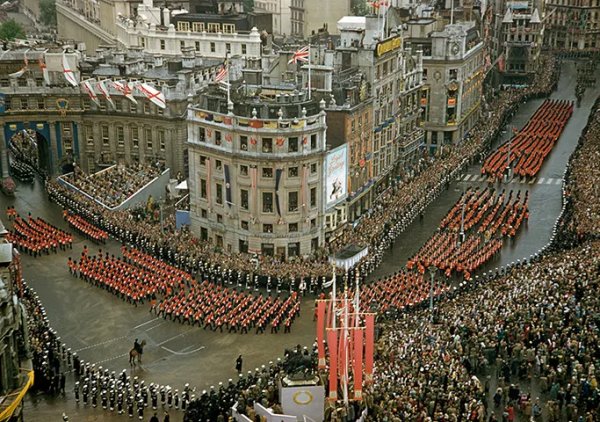
London - 1953
It was also understood that attention spans are shorter than they were in 1953. Relatively few people attend religious services on a regular basis, so a Service of over two hours was asking a lot of the patience of a television audience. It was cut to what was considered a bare minimum, but in retrospect it might have been cut a bit more, especially after the defining moment of the Crowning itself, without any loss in terms of theological significance. Any good scriptwriter knows the importance of wrapping up quickly after the big dramatic climax.
As Prince of Wales, the future Charles III had expressed interest in the possibility of a "multi faith" ceremony. In reality that was never an option. The Coronation is not a civil ceremony but a religious Service of the legally Established Church of England, of which the King himself is "Supreme Governor." His swearing an oath to maintain that is one of the most important parts of the Service. Representatives of other denominations and religions were invited to attend, and acknowledged politely, but this was, by definition, an Anglican show from start to finish.
The King's influence is more apparent in the musical programme for the Service. He alarmed some traditionalists by expressing a desire for greater diversity in the style of music. They need not have worried. This was after all the man who had invited the opera star Dame Kiri Te Kanawa sing at his Wedding to Lady Diana Spencer and that had turned out well - the Wedding that is, not necessarily all that followed.
The clever compromise in the Coronation Service was to have traditional parts of the Service sung in new styles. Thus the Kyrie was sung by Sir Bryn Terfel in Welsh and the Alleluia by a Gospel Music group, the Ascension Choir. The Byzantine Chant Ensemble sang Psalm 71 in the Greek Orthodox style, honouring the King's father, Prince Philip, who was a Prince of Greece. Music commissioned especially for this Coronation from, among others, Lord Lloyd-Webber, Sir Karl Jenkins, and the actor-composer Patrick Doyle was heard along with more familiar tunes commissioned for previous Coronations from Sir William Walton and George Frideric Handel. There really was something for everyone - including something for everyone who wanted something about which they could complain.
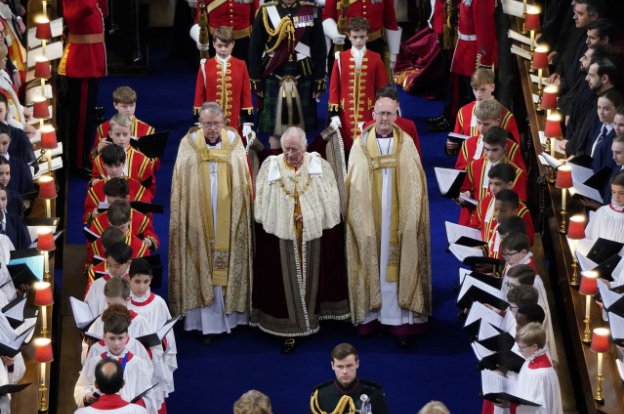
One has to agree with John Cleese, who should know, that much of the actual ritual now seems a bit Monty Python. One can appreciate the sense of continuity and tradition conveyed by the Anointing and the Crowning, but all that business with the Coronation Glove and the various Robes and the never-ending presentation of Royal bling added nothing. Younger people probably wondered if any of these artefacts were vested with special powers like in Harry Potter or the MCU. Sadly not. Quaint historical touches to stress the antiquity of the proceedings are no bad thing, but the Coronation ceremonies have evolved over the centuries, so it is no excuse to say something must be done because it has always been done.
After all, we no longer have the King's Champion riding his warhorse in full armour into the Coronation feast to offer battle to anyone who challenges the King's right to rule - even if, come to think of it, that would make a great television moment.
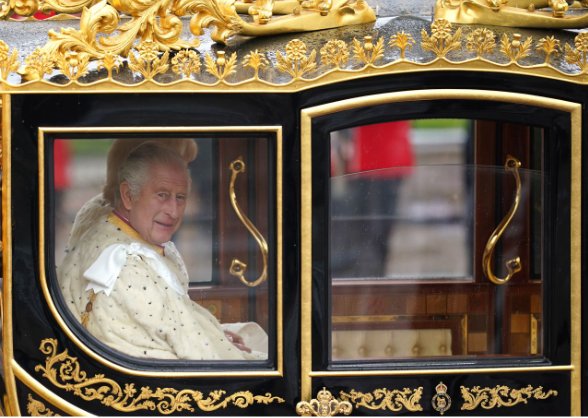
The costumes were also a bit overdone, too much fur and feathers - probably fake fur and feathers now. What we see anachronistically jumbled together in one place are relics of many different times, all of fashions long dead. Some rationalisation might have been aesthetically more pleasing. The King himself would have done better to have been crowned in military uniform, which he wears well. The traditional garments he wore were supposed to signify humility, which was appropriate before the Anointing, but perhaps he should have taken the opportunity while he was behind those specially commissioned screens - the Anointing being only part of the ceremony still considered to be too sacred to be broadcast - to slip into something a bit more uncomfortable. Or a side chapel could have been made available for a team of Royal valets trained to do a quick change like mechanics at a Formula One pit stop. That might have been fun for television audiences in its own right.
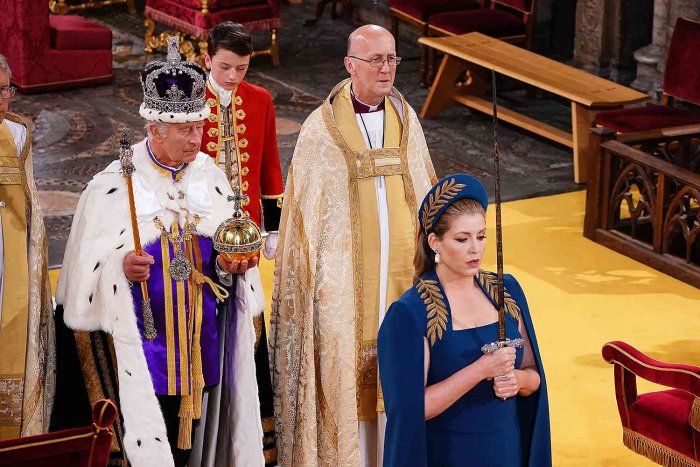
The person who best understood the assignment was the "break out" star of the show, Penny Mordaunt, the Lord President of the Council acting as Bearer of the Sword of State. Her ability to carry the nine pound Sword for a very long period at the physically uncomfortable present position without it so much as twitching attracted general admiration, as did her carefully considered choice of clothing. There is an official Privy Council uniform which she was entitled to wear, but she used her woman's prerogative to commission a clever variation, a teal dress embroidered with a fern emblem from the uniform. The colour choice was brilliant, eye-catching without being showy or inappropriate. It looked as if some personification of Britannia was guarding the King symbolically throughout the ceremony. It was just the image of modernity combined with tradition the King wanted to project.
Like most viewers in the UK, your reviewer watched the proceedings live on the BBC. Huw Edwards did well to restrain himself by keeping the commentary to a bare minimum during the Service, but the chatter passing for commentary elsewhere was poorly planned. The lack of co-ordination between what the commentators were saying and the pictures that were being shown at that moment was often very obvious. Given the preparation that went into the event itself there is no excuse for the BBC not having a tighter script and more technical rehearsal.
The BBC nevertheless secured over 12 million of the 19 million domestic viewers who watched the Coronation, peaking at over 20 million, making it, to date, the most watched programme on British television in 2023.
Perhaps more surprisingly it retained that title even after the much hyped Eurovision contest a week later broke the record for that show. The mainstream media at the time had seemed to be far more excited about Eurovision than about the Coronation.
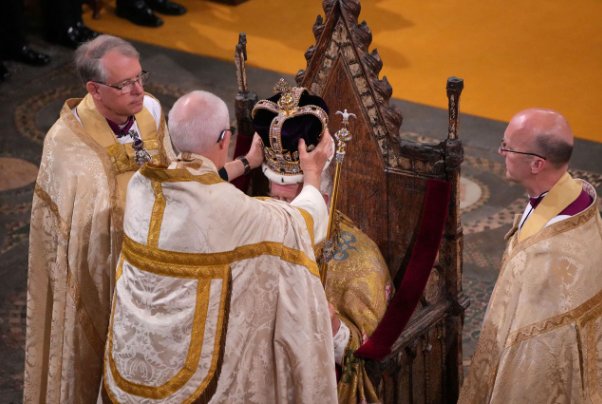
The Coronation was therefore by any standards a huge ratings success in the UK and it racked up respectable numbers abroad. Too much should not be read into the fact that the viewing figures still fell far short of those for Queen Elizabeth's State Funeral the previous year. After all, that was a personal tribute to one of the best known, and best loved, people on the planet, and to her seventy years of service, as well as the expression of a widespread feeling, one that extended even beyond Monarchists, that an era had come to an end.
More significant is the fact that the viewing figures for King Charles' Coronation were just below those for his mother's seventy years before when the population of the UK was only just over half of what it is now and television ownership was far from the norm. Indeed many people bought televisions specifically for the Queen's Coronation, which was therefore an important step towards making it the norm.
This drop in viewership is more a reflection of broader social changes than a comment on King Charles or the current state of the Monarchy. It is a well established phenomenon that people do not take an interest in organised events as they once did. Yet it is fair to say that the Queen's Coronation was a unique moment in history which her son's was not. The Crowning of a young mother was symbolic of a rebirth of the nation after the hardships of the Second World War, Post-War Austerity, and the loss of the Indian Empire. It was supposed to herald the beginning of a new "Elizabethan Age." The Crowning of a man in his seventies at a time of gloom and uncertainty was never going to have the same meaning. It was an interesting curiosity rather than a significant historical and cultural event in its own right.
Even so, the ratings for King Charles' Coronation would undoubtedly have been a lot higher but for the strange choice of time and date.
Queen Elizabeth had been crowned on a Tuesday and practically the whole country had shut down for the occasion. King Charles was crowned on a Saturday morning, when a good proportion of Britons are either shopping or hungover from Friday night or both.
In this context, 20 million viewers on a Saturday morning is a phenomenal success. Those figures would surely have been even higher had the Service been held in the afternoon, which would also have meant that more of King Charles' subjects in his other Realms of Canada and in the West Indies would have been up to see it.
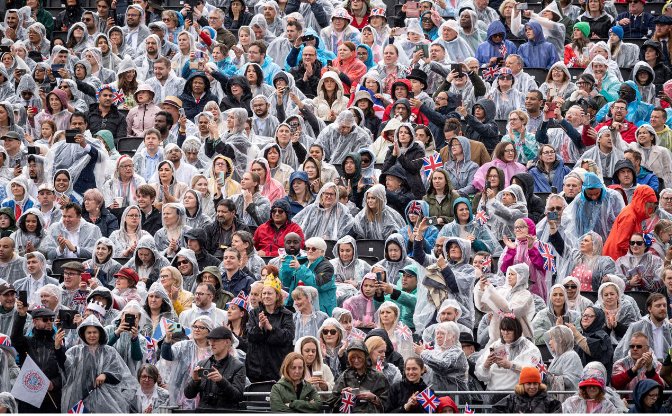
It is puzzling why those planning the event never saw this. Even more puzzling is their choice of early May rather than June or July when the infamous British weather was slightly more likely to be better. The conspiracy theory is that the Government expected - accurately - that it would lose heavily in the local elections in the first week in May and hoped the Coronation would distract from their humiliation. If so, it was a political mistake: the better strategy would have been to take it on the chin, let a few weeks pass, and hope that the Coronation would deliver a positive national mood on which they could begin to rebuild. As it was, they threw away a political advantage to no purpose.
On the day the British weather did what the British weather does, forcing the "Fly Past" to be scaled down dramatically. It did however have the positive side effect of allowing those present to do what British people do best - carry on cheerfully in the face of adversity - while encouraging those not present to stay indoors, thus boosting the ratings.
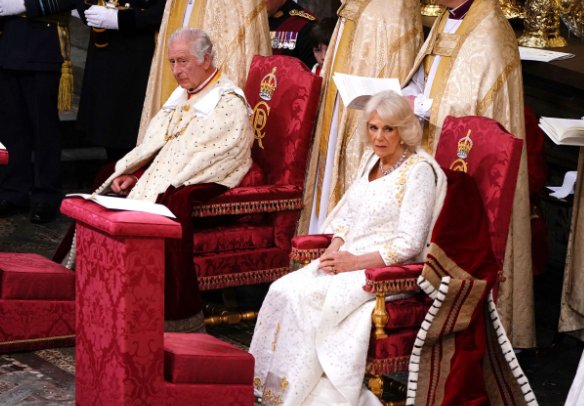
What those who were there and those who watched on television saw they are unlikely to see again. In planning his own Coronation, King Charles' imagination was surely fired by his memories of the one he attended as a four year old seventy years ago. It is also understandable if he wanted to do something big for his Queen, to proclaim to the world that the woman who had to put up with the title of Duchess of Cornwall when married to the Prince of Wales was more than his morganatic wife. The current Prince of Wales, who has no such motivations, is reported to believe this is the last time we shall see such a Coronation. After all, European Royals have abandoned them almost completely. Perhaps he and his advisers will feel differently when - hopefully many years from now - the time comes. If not, if this is the last such Coronation, at least we can be grateful to television for being able to see it.
